The Growing Pains of a New Chess Era
After crowning a new champion, chess is experiencing difficult “growing pains” as it prepares for a new era. World Champion Gukesh Dommaraju won the title a month ago against defending champion Ding Liren of China in a match between two Asian champions. There were celebrations in India, and the entire world marveled at the new era that was being ushered in by the next generation of stars. Arjun Erigaisi, Nordibek Abdusattarov, Alireza Firouzja, Wei Yi, Praggnanandhaa Rameshbabu, Hans Niemann, and Vincent Keymer, are inside the top 20, and all are 25-and-under. Gukesh will lead this crop into the next era of chess.
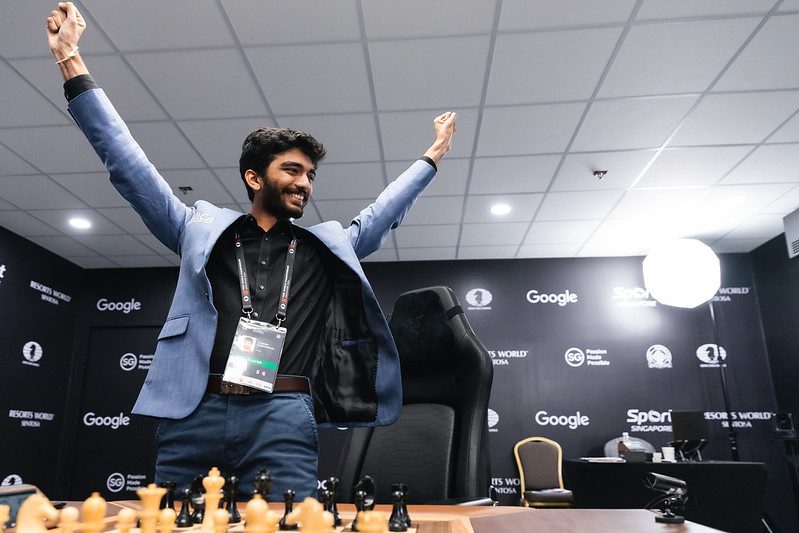
A triumphant Gukesh celebrates his historic victory
Photo by Eng Chin An
The Ding-Gukesh championship match saw a range of reactions, from the pre-tournament predictions, to harsh criticisms during the match, followed by glowing praise for Gukesh afterwards. Before the match, there were predictions that Gukesh would win +3 or +4 over Ding, despite the defending champion having reached 2800 less than two years prior. After Ding won the first game of the match, many took this to be a surprise, as if he was a middling 2600 player.
What was lost on many was that Ding’s tournament performance in the past two years has little to do with matchplay. The preparation and psychology of a head-to-head match are totally different. When people say things like “Ding is overachieving because Gukesh is underachieving,” it may have been that Gukesh was not as overwhelming a favorite as people suggested. Ding was well-prepared, and as the match wore on, we saw his resiliency shine.
The Irony of a Champion
There were many shocking comments made by top players about the match, from Garry Kasparov saying that this was not a true world championship match to him adding that the world championship cycle ended with Magnus Carlsen.
Video by Chess.com
This is a reckless statement but also ironic, given the damage Kasparov caused by the 1993 PCA split. In the same vein, Carlsen decided not to defend his title, leaving the remaining players to pick up the pieces of a fractured cycle. Of course, Kasparov’s contention that because the best players are not playing, then it cannot be a true world championship. However, the players playing for the title actually qualified, and those rated higher didn’t.
When Ding beat Ian Nepomniachtchi, he was ranked #3, and Nepo was #2. Kasparov also stated that this was not a real championship match. He is merely echoing what he felt when he seceded from FIDE. Bear in mind, these players have no control over the cycle, and it is unfair to denigrate the match simply because the defending champion quit. Kasparov’s leaving FIDE and taking his “defacto champion” status did not benefit chess and left a deep scar.
The Chinese Chess Boom
Then there was Hikaru Nakamura‘s contention that a Ding win would set chess back 2-4 years. He mentioned the current chess boom in India. While the point is understood, there is no indication that India would be adversely affected if Ding had won. India’s growth to 85 Grandmasters has been organic and will most likely continue regardless of who the champion is.
Would India see faster growth with Gukesh as champion? Perhaps, but the notion that Ding’s reign would somehow put chess in a bad place is strange. The point is that the treatment of Ding during the match was very unfair. Despite his uncharacteristic slump, we don’t yet know how Ding’s one-year reign has impacted the next generation of Chinese talent.
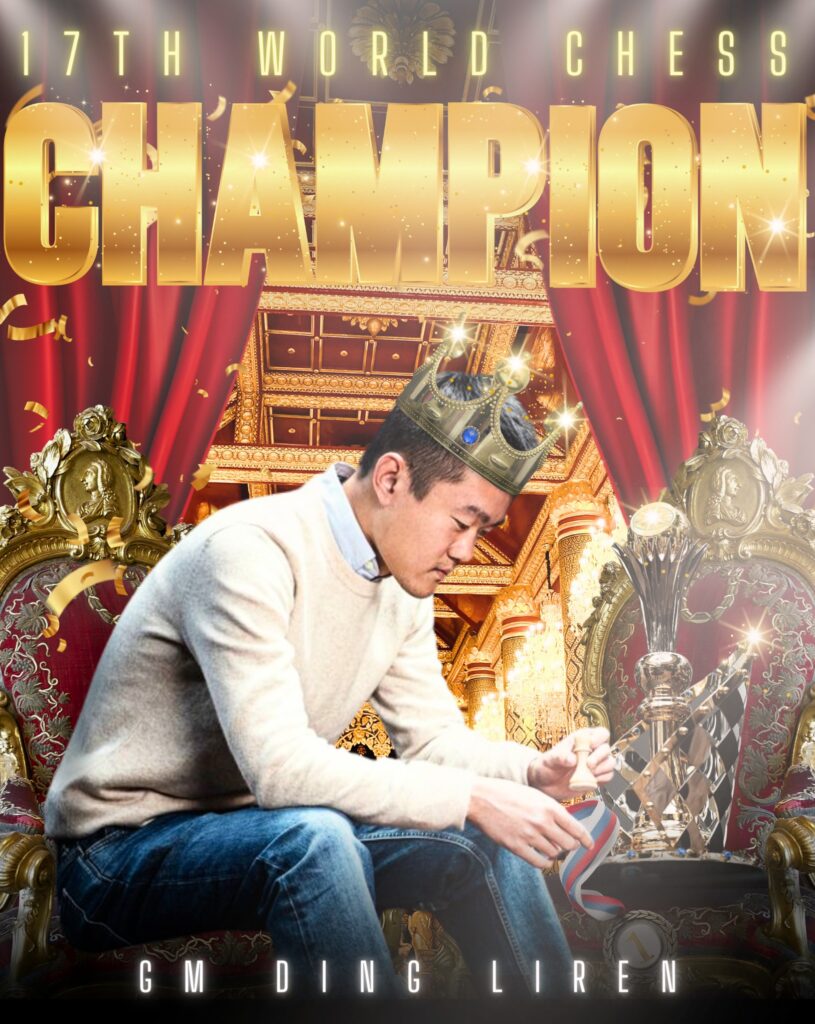
Here is what we do know:
China has undoubtedly made an impact on chess in the past 30 years. The open team won Olympiad gold medals in 2014 and 2018. Ding Liren, who became a Grandmaster in 2009, is a product of that revolution that also produced Bu Xiangzhi (1999), Wang Yue (2004), Wang Hao (2005), Li Chao (2007), Ni Hua (2009), Yu Yangyi (2009). and Wei Yi (2013) … eight homegrown players over 2700 in just 15 years! What other nation can claim this?
Chinese women have traditionally dominated Olympiad tournaments (since 1990, six gold, four silver, four bronze) and produced most of the recent women’s world champions (Xie Jun, Zhu Chen, Xu Yuhua, Hou Yifan, Tan Zhongyi, and Ju Wenjun. This alone deserves merit. Few have mentioned the chess boom in China, but more than 20 years ago, “Why China Will Soon Dominate Chess” appeared on these pages. We should recognize that Liu Wenzhe’s Chinese School of Chess has produced results. National Coach and Grandmaster Ye Jiangchuan did well in leading the revolution.
Dint Liren and Ju Wenjun (CHINA)
— Batumi Chess Olympiad 2018 (@BatumiChess2018) October 5, 2018
Photo: @davidllada #BatumiChess2018 pic.twitter.com/F32w5ek57f
Growing Pains of a New Era
While Ding is part of a successful generation that has included Magnus Carlsen, Fabiano Caruana, Hikaru Nakamura, Ian Nepominachtchi, Maxime Vachier-Lagrave, and Anish Giri, the new generation adds an element that has been missing for the last 10 years. In various iterations of the Grand Chess Tour, we saw tournament after tournament with a different combination of the above players, with other veterans such as Levon Aronian, Wesley So, and Leinier Dominguez.
While these are all excellent players, it became somewhat repetitive. From a viewer’s standpoint, it was hard to tell one event from the next. This continued in online events. What we are seeing now is a refreshing shift from the same cadre of players. Hopefully, some of the young talented players will get a chance to prove themselves at the highest stage in classical chess.
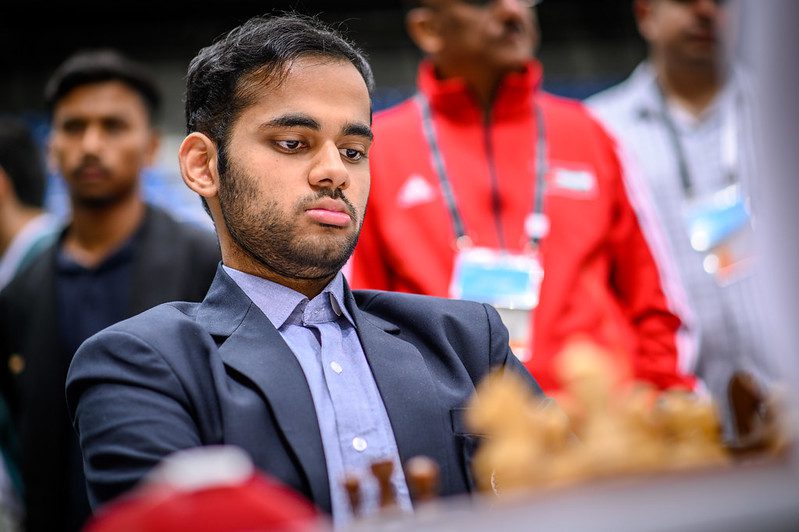
Photo by Michal Walusza
What really puts chess back 2-4 years is fueling false cheating accusations (which have recently arisen against Andy Woodward’s 1.a4 move), denigration of the world title, negative comments about the match (and Ding), using social media platforms to spew gossip, and the overall mean-spirited tenor of the chess community. Bobby Fischer once said he did not have chess friends because they were “mean-minded” and “petty.” This may have been an emotional response to how isolated he felt in chess, but the toxic energy he saw then certainly exists in today’s game.
Case in point… Daniil Dubov forfeited a game against Hans Niemann and then claimed he fell asleep while preparing for the game. When interviewed by Levy Rozman, he was a bit incoherent in his response and implied that there was a hidden meaning.
“Well, what happened, happened, yeah? I mean I went to the hotel and I mean I came back and I said I was sleeping, yeah? What do you want me to say? Unless you’re an idiot you know what happened. I know you’re not. It’s my first time in the US. It’s very hard to control the jet lag here. That’s life.”
~Daniil Dubov on why he forfeited against Hans Niemann
Many believe it was a veiled protest against Niemann by Dubov, who has worked as part of Carlsen’s team against a fellow Russian, Nepomniachtchi. This is not his first protest. Dubov also forfeited a game in Tata Steel 2022 against Anish Giri because he refused to wear a mask after someone in his team became infected with COVID-19.
After the tournament, Dubov went into a back-and-forth with Niemann and accepted a 24-game challenge if Niemann passed a lie detector test on cheating. “If the test comes out clean, I will accept my decision was rash…” Decision? So, if it was an intentional decision to forfeit, why lie about it? There was some poetic justice. Because of his protest, Dubov missed out on making the final eight qualifiers, costing him at least $9,000. The “Dubov Gambit” turned out to be refuted.
Let it be a lesson to us all.
The Inescapable Toxicity of Chess
Some of the controversy swirling around the chess world has undoubtedly been in the media cycle once again after the recent “jeansgate.” The cheating scandal with Carlsen falsely accusing Hans Niemann, followed by runaway accusations by Vladimir Kramnik, has created a toxic online environment. Reddit megathreads and venom spewed on social media platforms have dominated chess for the last few years.
The controversy unfolded with Carlsen wearing jeans to his round-six game with GM-elect Brewington Hardaway. After his next game with Daniel Dardha of Belgium, he was fined $200 and reminded to comply. He played yet another game in the same jeans against Aryan Tari of Norway. Before the next game, he was told he had to change before being paired. Carlsen stated he had forgotten and offered to change the next day. Arbiters insisted on compliance.
Instead of complying, Carlsen decided to quit the tournament and left with his now-wife Ella Victoria Malone. The dress code violation and his withdrawal created another media controversy. In his Take, Take, Take interview with Levy Rozman, Carlsen said if FIDE wants to enforce such rules, then “Fine, then I’m out. F*%k You!”
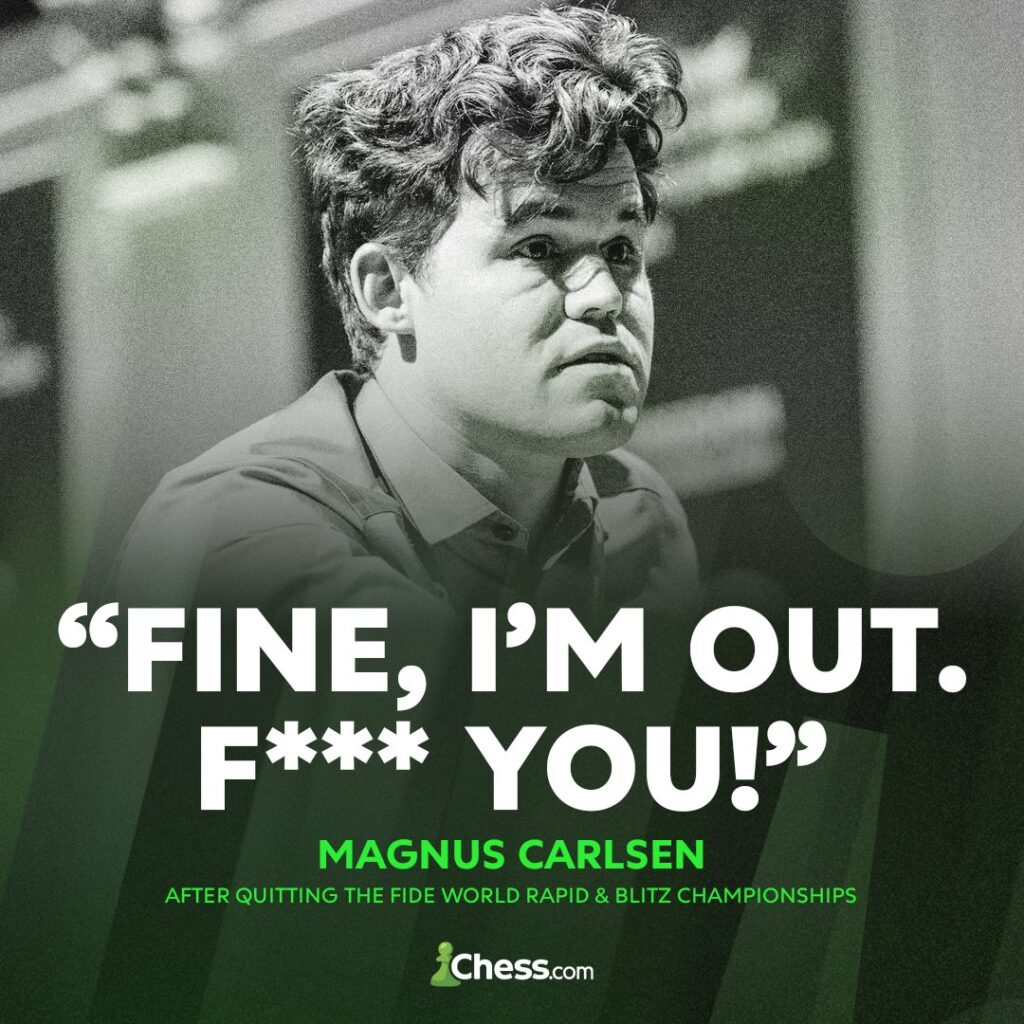
The controversy was now viral, and the chess community was divided. A day later, FIDE allowed him to play in the blitz tournament and allowed him to wear jeans. On the one hand, Carlsen said he understood the need for standards of a dress code, but on that day, he suggested a compromise. After being denied, he was reinstated, which may have set a precedent for other rule changes.
It was pointed out that the dress code was agreed on by a commission that did include player input (FIDE’s Athlete’s Commission).
The dress code regulations are drafted by members of the FIDE Athletes Commission, which is composed of professional players and experts. These rules have been in place for years and are well-known to all participants and are communicated to them ahead of each event. FIDE has also ensured that the players’ accommodation is within a short walking distance from the playing venue, making adherence to the rules more convenient.
~FIDE via X/Twitter
The lesson here is if you have rules agreed upon beforehand, stick to them. If you are not going to stick to them, don’t have the rule. The problem here is that FIDE changed midstream, and President Arkady Dvorkovich threw both FIDE CEO Emil Sutovsky and FIDE Vice President Viswanathan Anand under the bus by overruling their decision. It set a precedent for the next proposed change.
Right on cue, Carlsen was involved in another situation. After splitting four blitz games and three hard-fought draws in the blitz final, he asked officials if he and Nepomiachtchi could share 1st place. After a brief conference, FIDE agreed to have co-winners of the blitz segment. It got a mixed reaction, with both sides arguing strongly. Later, Carlsen was captured on a nearby microphone, telling Nepomniachtchi that they could play short draws until FIDE agreed to their terms.
Posts from the chess
community on Reddit
Here was one Reddit post from a new fan, offering rare objectivity…
This is bad for chess. As someone who only really started actively watching tournaments and following the scene over the last year or so, my general impression has been extremely negative. I don’t really feel motivated to continue. Magnus is portrayed as an ambassador for the sport, and if that’s the case the sport has a very rocky future ahead of it. From my view of limited context he seems to be doing everything he can to undermine the credibility of the sport. And the governing body itself seems incapable of controlling him. No single player is bigger than the sport itself, no matter how successful they are during their career. But they are capable of doing damage and that’s exactly what I see happening now. Eventually Magnus will be gone, chess will still remain and probably so will FIDE. But what that future looks like depends on the decisions FIDE make now. I felt demotivated to watch any future tournaments after the way the Blitz ended yesterday.
While Carlsen clarified these comments as a joke, it created intense discussions on how much influence he has wielded over FIDE. Someone of Carlsen’s caliber should have significant influence, but providing him with the latitude to affect rules and regulations mid-tournament creates the precedent for other changes and, eventually, a chaotic situation.
What Does the Future Hold?
Of course, Carlsen feels that he is taking chess to the next level, but if one characterizes classical chess as “boring” and the world championship match as “outmoded,” then there is a big problem… or maybe getting bored is his problem. We all became attracted to chess because of its virtues. Carlsen spent a lifetime studying or playing classical chess and now wants to try other things. The problem is he seems to believe it should be one or the other.
As a former marketing professional and chess player, moving faster does not necessarily make chess more marketable. You can have a very attractive theme in marketing classical chess just as you can blitz chess. It simply depends on what narrative you are trying to promote and how you present the product. Most companies that use chess in advertisements do not show people playing blitz. Rather, they symbolize the elevation of thought through measured calculation to make the best decisions. That is what chess has been and how it is often perceived.
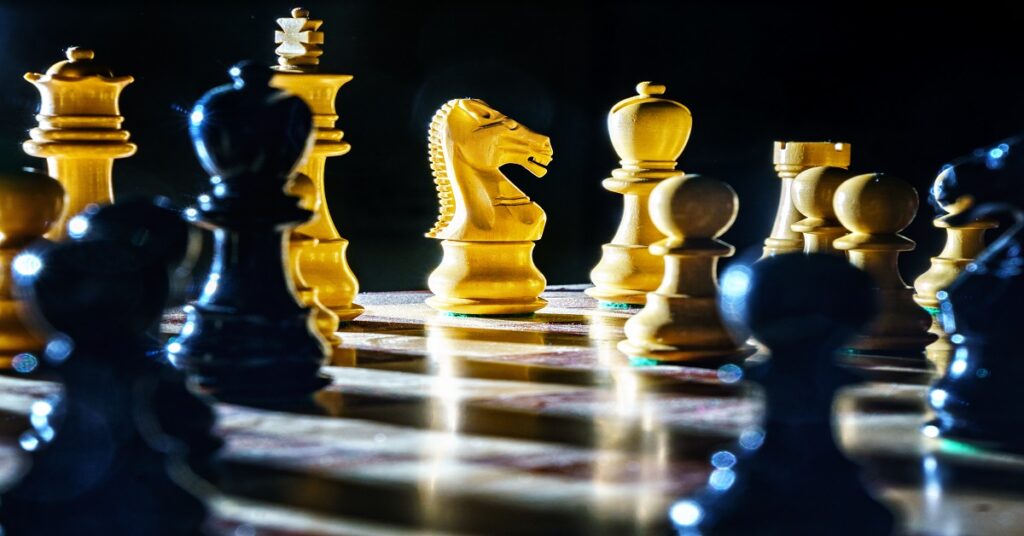
Chess has never been boring. Again… the point that chess takes too long is a problem of the individual, not of chess. You can play and enjoy blitz, but calling chess boring (in any form) is a bit disingenuous. Chess doesn’t necessarily need to speed up to be exciting. Many people who watch international football (futbol) would cringe if you tell them that the sport should be played in an indoor hockey rink with fewer players because it would be more exciting and increase the scoring. No futbol purist would agree, yet we do this to chess.
Changing the format to knockout or a fast pace will not change the fact that classicial has to be part of the tradition. The Ding-Gukesh match was filled with drama and excitement and was decided in the last game… albeit on a tragic blunder. The question remains whether classical will be the only discipline in a world championship match.
Crown Me King
Chess media has focused on Carlsen as if to ensure that he maintains relevance and continues to be the face of chess, despite giving up the world title. As a sign of reverence, Gukesh has even deferred to Carlsen’s #1 status. It is understood that Carlsen is currently the strongest player, but Anand never had to make that type of admission during his reign. Hopefully, Gukesh will be able to enjoy the newness of his title without these types of slights. Gukesh has handled this matter like a professional.
The entire situation puts Gukesh in an awkward situation. Forcing him to make concessional statements such as “I am not the best player” takes away the sheen of the title he rightfully earned. Carlsen relinquished his title, and that was his prerogative, but at the same time, classical chess still holds the highest prestige and honor. It has always been the standard by which we have displayed chess excellence, and younger players want the same opportunities that Carlsen enjoyed.
Carlsen stated in a New in Chess interview that “Fischer Random/Chess 960” is the future of chess. His current rebranding of Fischer’s idea involves a financier, and more than 20 players have committed. Prior to the Ding-Gukesh match, he organized a match in Singapore with Fabiano Caruana to promote his idea right before the world championship. The controversy started over the use of the name “world championship.” Of course, FIDE cannot trademark the name, but it is the body hosting all world championship events on chess. That is widely understood.
While Carlsen seems to be making genuine attempts to popularize chess, it should not be made into an “either/or” issue. He has legitimate points about chess needing other ways to enhance the championship format. At the last press conference of his 2021 match against Nepomniachtchi, I asked him if he thought the title should include formats like rapid, blitz and 960 as part of the championship. He said he was open to such ideas.
Video by FIDE
Detoxing and Healing
Chess has been going through growing pains in the past 50 years. In this period, it has become a global sport, touching all nationalities and demographics. We have become enthralled by the beauty of Caissa. Despite the continuity of chess tradition, three of the greatest players in history (Bobby Fischer, Garry Kasparov, and Magnus Carlsen) have also been the greatest disruptors. The chess world has found itself in trouble whenever it centers its existence on a singular personality.
With Fischer, he fought for conditions and moved chess into the mainstream, but he bolted the world championship. He also promoted useful ideas like the Fischer clock and Fischer Random. Kasparov broke away from FIDE, advocating for transparency from corruption and better conditions. He created a breakaway faction and created a split that lasted 13 years. Thereafter, he became a literary giant and political activist. Carlsen bolted the world championship but is trying to bring excitement to chess by advocating knockouts, faster play, and Fischer Random.
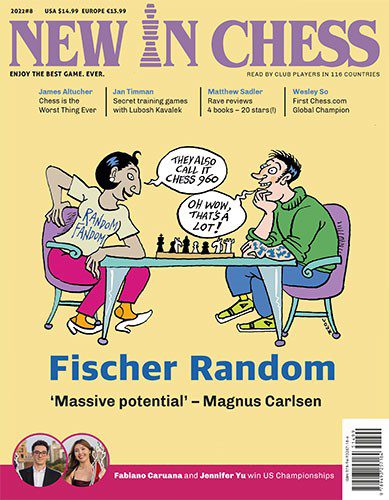
These are not new ideas, but finding a way to make chess more appealing is something we all want to see. In the past four years, the online platform has exploded and increased the popularity of chess. The side effects of this growth have borne some pain. The specter of cheating has become even more prevalent. The toxic nature of cheating controversies is a symptom of a larger problem, and perhaps FIDE has not adjusted to how to handle all of these issues. Not to mention an attempted poisoning at a chess tournament. That is toxicity…. literally!
In the Final Analysis…
These champions are right. Chess needs to evolve. Growing pains usually mean progress. However, innovations should not be promoted at the expense of classical chess tradition. We want to see the expression of chess at the highest level. We want to see fast chess as well. We also want to see chess where no player has trod, such as Fischer Random. We have never explored positions #117, #451, or #877. It would be interesting to understand each of these positions just as we have position #518.
The version of chess that we play (RNBQKBNR) has enthralled us for 1500 years. It is my view that Fischer Random is the future of chess, but only the classical version will sustain chess. Relying on anything faster (as the standard) will create a situation with no consistent quality of play. Let’s embrace new ideas and keep the classical tradition that gave us such exciting matches over the past 140 years. Chess does not need gimmicks to be attractive. Chess speaks for itself.
